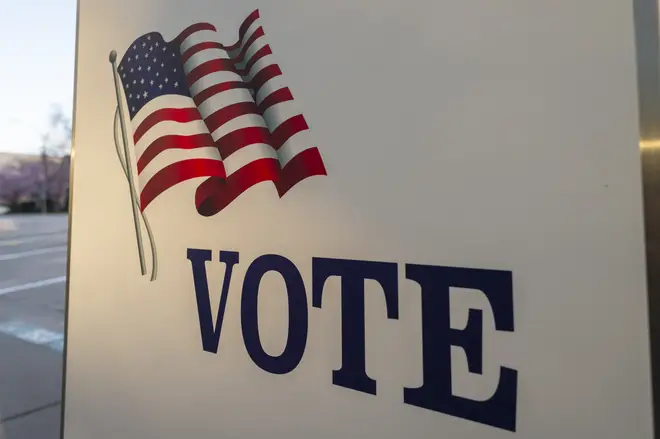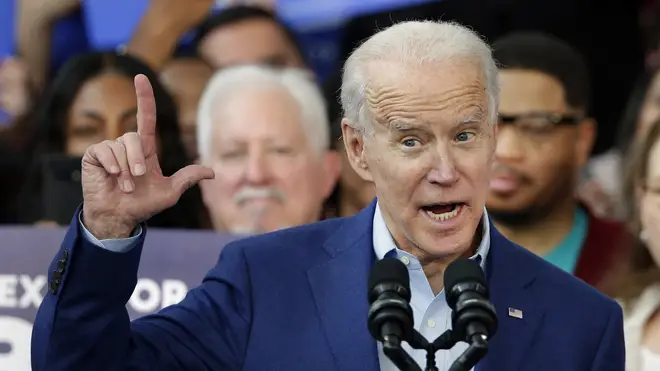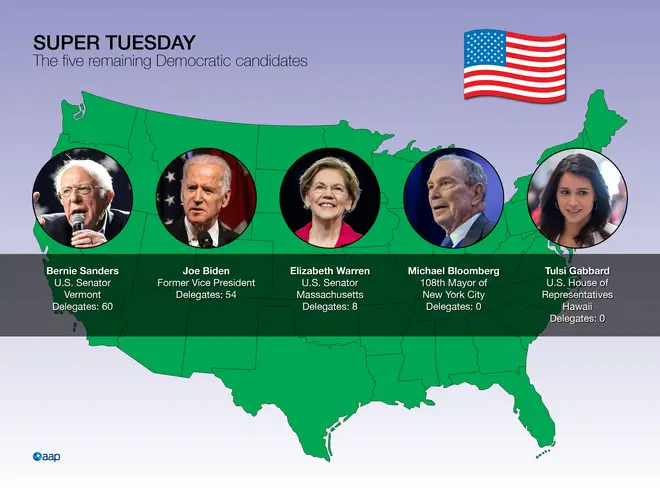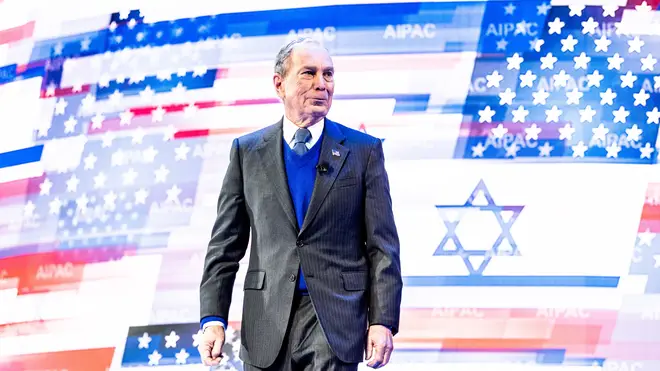
Matthew Wright 7am - 10am
3 March 2020, 19:36 | Updated: 3 March 2020, 20:02

The race to become the 2020 Democratic presidential candidate will heat up later as voters from Maine to California head to the polls on Super Tuesday.
Today marks one of the most important moments in the battle to become the Democratic nominee for the 2020 US election.
It is, effectively, when the contest goes nationwide.
Tuesday 3 March, better known as Super Tuesday, will give us a much clearer view of who will be the most likely candidate to take on President Donald Trump for a place in the White House.
Senator Bernie Sanders is currently leading the way in the Democratic race and today could see the 78-year-old pull away from the chasing pack.
However, former vice president Joe Biden is hot on the heels of the Vermont senator, while former New York mayor Michael Bloomberg will be appearing on a 2020 ballot for the first time.
Elsewhere, Massachusetts senator Elizabeth Warren, who has so far struggled for momentum but debated well, and Hawaii representative Tulsi Gabbard, also remain in the race.
But what is all the fuss about? And why is Super Tuesday so important?

Today marks the day where the Democratic race heats up and spreads across the North American continent.
Voters in 14 states, from the Atlantic east coast to the Pacific west coast, will head to the polls to choose their Democratic presidential nominee.
Among those are the nation's two most populous states, California and Texas, with nearly one-third of all the delegates at July's Democratic National Convention up for grabs.
It means that candidates will have to appeal to multiple states, with highly contrasting political tendencies, all at once; a job much easier said than done.
Though Super Tuesday does not necessarily determine who will represent the Democrats, it has traditionally been very difficult for a candidate who performs poorly to recover.
Ultimately, today will separate the wheat from the chaff.

Vermont senator Bernie Sanders is currently the frontrunner in the Democratic race, and he has spent months trying to resonate with less privileged sections of society, such as Latino voters in California and Texas.
The 78-year-old has also energised young, liberal voters more so than his rivals and could steam ahead by the time the polls close.
On the other hand, former vice president Joe Biden has established himself as the party's moderate candidate who could instead attract the vital 'Middle America' vote.
A wave of momentum has helped Mr Biden secure his place as Mr Sanders' main competitor and a strong showing in the South Carolina primary could be a sign of further successes to come.

Elsewhere, former New York mayor Michael Bloomberg, who has invested more than half a billion dollars in his campaign, will appear on a 2020 ballot for the first time on Tuesday looking to challenge Mr Biden's establishment appeal.
Super Tuesday will be a critical test of his theory that he is the best 'anti-Sanders' candidate and, ultimately, the ideal 'anti-Trump' candidate.
Massachusetts senator Elizabeth Warren, who has struggled for momentum despite debating well, will hope to at least win her home-state primary on the day, while Hawaii representative Tulsi Gabbard is also still in the race, despite not yet securing a single pledged delegate in the first four Democratic primary races.
Amy Klobuchar, Tom Steyer and Pete Buttigieg have both dropped out of the race ahead of the big day.
There will be 14 states voting, including the behemoths of California and Texas. California offers 415 delegates, while Texas offers 228.
Other states include Arkansas, Alabama, Colorado, Maine, Massachusetts, Minnesota, North Carolina, Oklahoma, Tennessee, Utah, Vermont and Virginia.
While most southern states are Republican strongholds come the election, and California and Massachusetts, in contrast, are Democratic strongholds, swing states such as Colorado, Minnesota, North Carolina and Virginia become increasingly important for the candidates to garner support and win big.
There are more than 1,300 delegates up for grabs in total on Super Tuesday.

Firstly, voting has begun for Super Tuesday.
However, because the landmass of the US spreads across several time zones, there is no single time for when the polls will close.
The first will shut in Vermont, where voting will stop at 7pm Eastern time (midnight UK time), and the last will close at 11pm Eastern time (4am Wednesday UK time).
We will not be expecting a full account of the results on Tuesday, or perhaps even the following day, as counting the votes in California can sometimes take days. Meanwhile, overseas voters have until 10 March to send off their choices.
However, results in smaller states are expected to come sooner and will give us a greater idea of who is in the lead. Additionally, clear signs of high margins in California could also see an early declaration there.